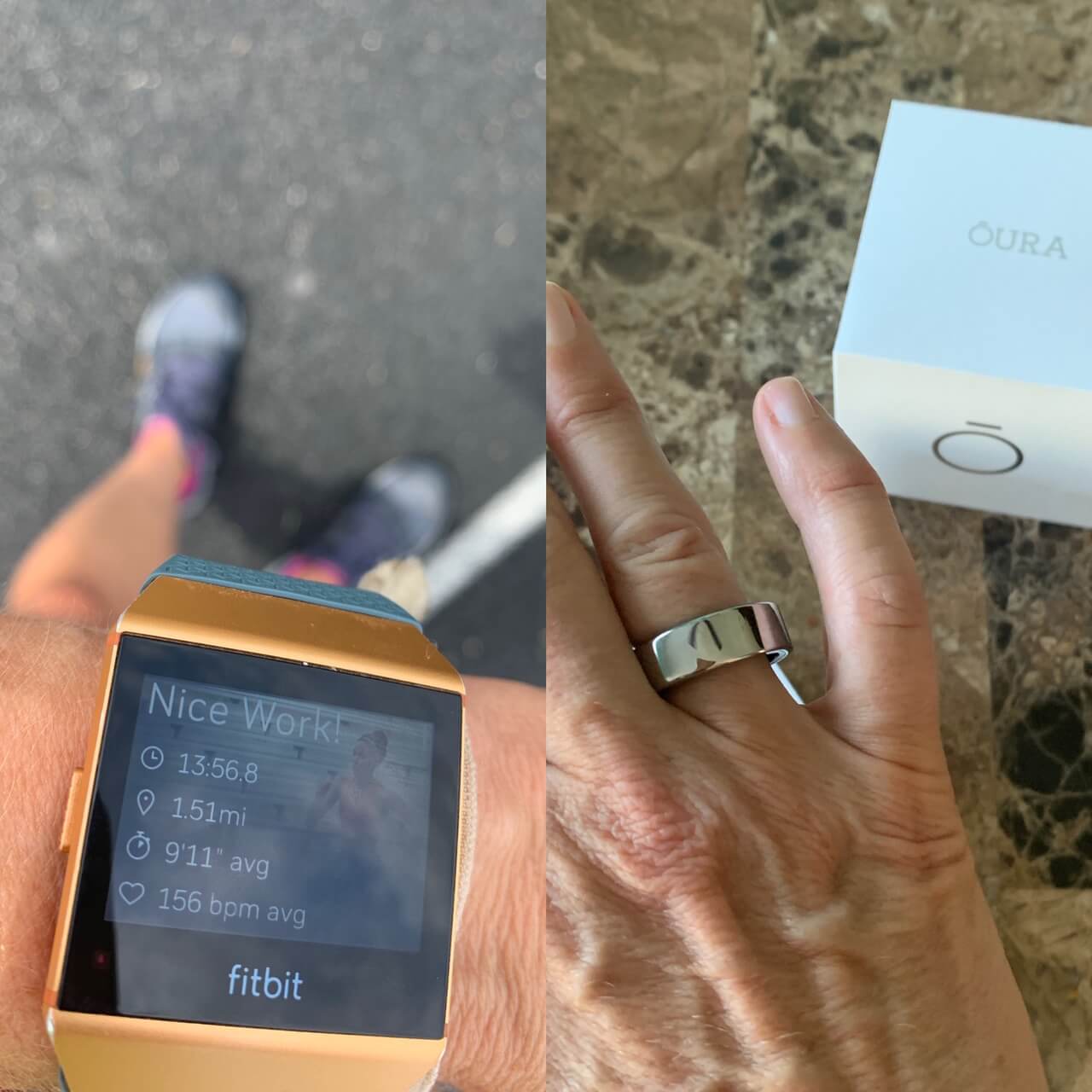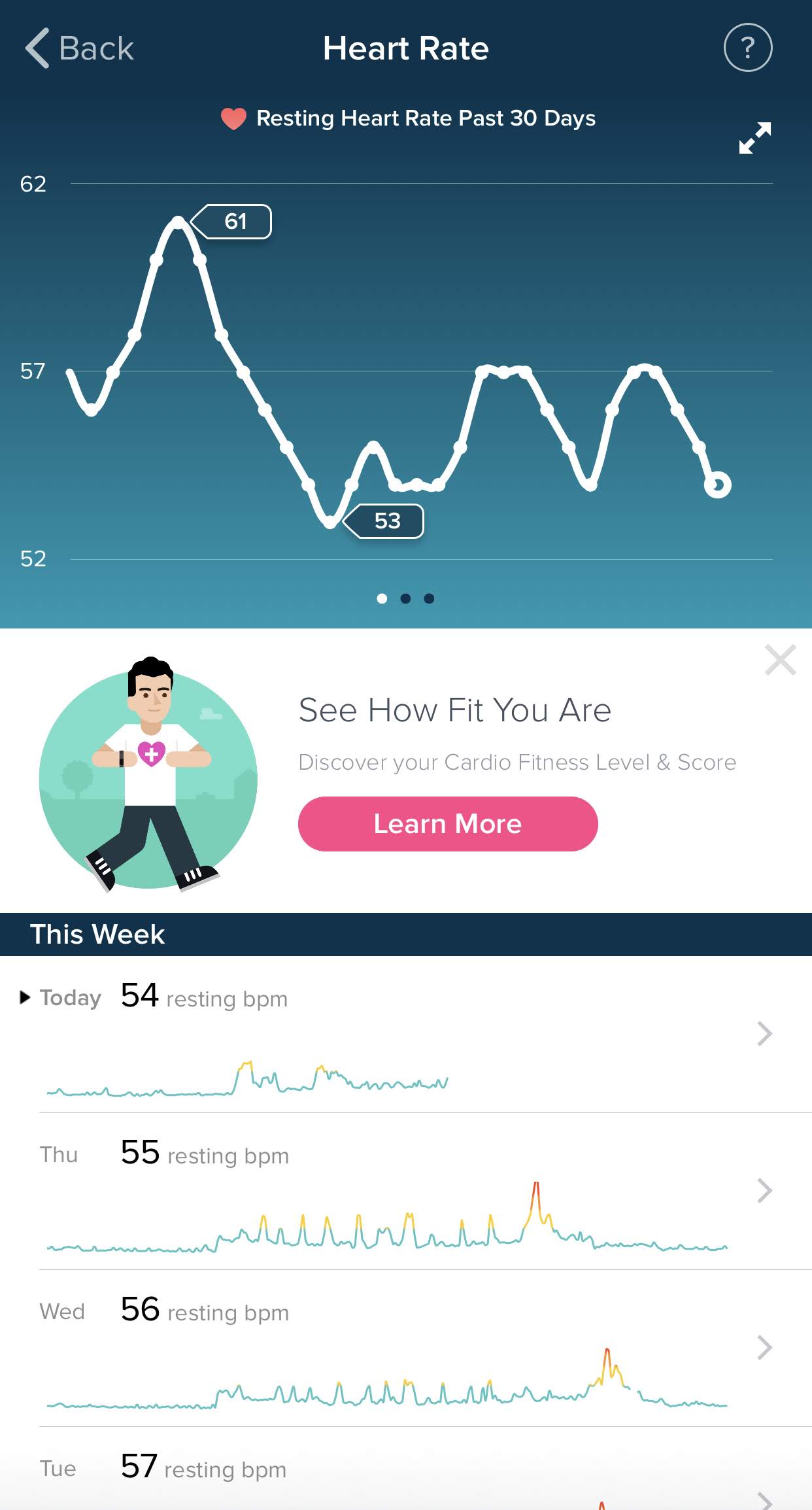I’ve been wearing a Fitbit for about five years. I wear it all day to track steps, sleep, and workouts. I like the accountability of step tracking to make sure I move around enough each day; I love the weekly challenges with my friends —and total internet strangers.
Is Fitbit your friend or foe: pros and cons of fitness wearables.
I recently bought an Oura Ring. An Oura Ring tracks many of the same metrics as the Fitbit, plus a few exciting extras that I’ll explain. I thought it would be interesting to compare my Fitbit Ionic to my Oura ring: Which is better for tracking? Do you need both? If I had to choose one which would it be?
Fitbit Ionic Vs. Oura Ring
INITIAL THOUGHTS ON OURA RING
The Oura ring is a fitness tracker hiding inside a discreet ring you wear on one of your non-dominant hand’s fingers. When you order the ring, they first send you a sizing kit with a variety of plastic rings to try on for size. They suggest you wear the plastic dummy-ring for a day or so you get the normal fluctuation of your finger size over the day because the sizing is different than your regular rings due to the sensors on the underside.
I originally heard about the Oura ring from a training client, and was initially impressed by the daily readiness score.
The readiness (to work out) score is determined by your daily metrics; including the quantity and quality of sleep, resting heart rate, body temperature, and previous day’s activity.
I struggle a bit with knowing whether I am recovering from workouts. You can’t rely on soreness as an indicator; just because you are not sore does not mean you are ready to work out again. You can’t always judge readiness by how you feel; my brain often tells me I’m too tired, but once I get started, I feel fine.
I am currently on a run streak, which means I run at least a mile every day. If I run a slow mile, is that interfering with my recovery? Or is one slow mile gentle enough for a rest day? While I like the run streak to keep me consistent with running, could it be interfering with my results? These are questions I hoped to answer with the Oura ring.
Let’s compare the features of Oura Ring and Fitbit Ionic
Sleep Tracking
The Fitbit Ionic and the Oura ring both track sleep, and the results each night are similar, yet not the same. I assume it is because all technology is using algorithms to deliver results.
The Oura ring probably has more accurate sleep metrics because it takes your pulse from your finger rather than from your wrist. However, the sleep results are similar enough that either would be sufficient for most people to make improvements.
My Oura ring often tells me I get more deep sleep than the Fitbit does for the same night. You can see in the images below that the data is similar for the same night. If sleep tracking accuracy is an essential feature to you, I would suggest you choose the Oura ring over the Fitbit because it offers some additional metrics.
Oura Ring Sleep Data
Fitbit sleep data
In addition to total sleep and the time spent in the various sleep stages, the Oura ring provides more in-depth metrics to help monitor the quality of your sleep:
Efficiency—percentage of time spent asleep after you go to bed
Restfulness—disturbances that interrupt sleep
Latency—how long it takes you to fall asleep
The timing of your sleep—what time you go to bed and what time you wake
apparently I’m not dreaming big enough. noted.
Who wins? I’ll give it to Oura for slightly more accurate and in-depth data.
Resting Heart Rate
The Fitbit and the Oura ring both track resting heart rate, which can be important to track to monitor health and readiness. If your resting heart-rate rises for no apparent reason, you may be getting sick, injured, or over-trained.
Drinking alcohol will spike your resting heart-rate. I notice if I have a glass of wine (or three), I’ll have an elevated heart rate for three or four days following.
My resting heart-rate is considerably lower on the Oura than on the Fitbit. I think it’s just a difference in how they measure resting heart-rate. In this case, it doesn’t matter which one is more accurate; the critical part to pay attention to is how it varies day-to-day. If your resting heart-rate spikes for no apparent reason, you know it’s time to back off the hard training, as an elevated resting heart rate can be a sign of over training.
Who wins? Tie game. Either device is sufficient for this data.
Fitbit data: guess which day I drank wine.
Oura data. Resting heart-rate is much lower
Heart Rate Variability
When a person is relaxed, a healthy heart’s beating rate shows variation in the time interval between heartbeats.
A high HRV is a sign of good health and fitness. Monitoring your HRV can help you determine your recovery status and readiness to workout. The Oura Ring provides a daily HRV, which factors into your readiness score.
The Fitbit does not provide heart-rate variability data and is not compatible with third-party heart-rate variability applications.
Oura ring heart rate variability
Who wins? The Oura ring takes this one.
Step Tracking
Both the Fitbit and the Oura ring track daily steps. Some days the Fitbit is higher, and some days the Oura ring shows more steps, but they are usually within a reasonable range. As with any step tracker, it doesn’t matter the accuracy of the data as much as the work you put in to improve.
Who wins? Tie game.
GPS Technology
The Fitbit Ionic has the same GPS technology as Garmin, so I appreciate an accurate GPS with a watch I can wear all day. The Oura ring does not have GPS technology; you will need a separate device to track your runs.
Who wins? Fitbit Ionic takes this one.
GPS: How to tell if you’re in a bad relationship with your GPS watch
Activity Tracking
The Oura ring does not automatically record cardio workouts, and it barely notices strength workouts, until your heart-rate spikes. It will automatically log the number of steps and will add the calories burned based on elevated heart rate to your activity score, but you must manually enter any workouts.
If you are looking for a workout tracker, then the Fitbit is a better choice; it automatically records walks and runs when it senses you are moving.
I synced my Oura ring to the Apple Health app which syncs to the Strong app to automatically log my strength workouts, but I haven’t found a way to connect any of the apps I use for runs or walks.
I have to manually enter any workouts into the Oura app, and I’m sure I burned more than 2 calories breathing during my 53 minute strength training workout. It was hard, I swear!
I like that the Oura ring gives a daily activity target that varies each day based on your previous day’s rest, activity, and sleep quality. If it knows you slept poorly and worked out hard yesterday, it may give you a lower activity target to hit today, rather than the arbitrary step goal you enter into Fitbit.
Who wins? For activity tracking, Fitbit is the clear winner, although I do like the Oura ring because the activity goal automatically adjusts each day based on readiness.
Readiness
Recovery is an integral part of the workout process. You get stronger and faster during the recovery period after the workout, not during the workout itself. So if you work out hard and don’t allow your body the time it needs to recover, you may not see the full benefit of your workouts.
The Oura ring gives you a readiness score each morning based on your previous day’s metrics. If I slept under seven hours of quality sleep or performed a hard cardio-based workout, it will always give me a low readiness score the next day. One hour of hard strength training sessions don’t seem to affect my readiness score, but I’m not sure how that is factored in.
Oura ready!
Oura don’t push it
Oura take a break
The Fitbit doesn’t offer a readiness score, but you can estimate your readiness based on resting heart-rate, sleep quality, and hard workouts recently performed.
Who wins? The Oura ring is the winner here, but with a little common sense, you could pull the FitBit data to get a similar idea of your readiness to work out.
Appearance
While appearance is likely the least important factor in your decision-making process, the ring is subtle; most people wouldn’t recognize it as a tracker. The FitBit is a noticeable activity tracker, while attractive, may not be appropriate for business or formal events.
Who wins? The Oura ring is more discreet and attractive, but I don’t mind wearing a watch all day for the additional features.
Oura Ring VS. Fitbit Ionic Summary
Sleep tracking:
Oura Ring
Resting heart-rate:
Tie between Oura Ring and Fitbit Ionic
Heart-Rate variability:
Oura Ring
Step tracking:
Tie between Oura Ring and Fitbit Ionic
GPS:
Fitbit Ionic
Activity tracking:
Fitbit Ionic
Readiness Score:
Oura Ring
Appearance:
Oura Ring
Which is better, the Fitbit ionic or the Oura Ring?
It depends on your goals. If you’re an athlete and tracking workouts is essential, then the Fitbit ionic will better deliver those results, as well as some essential sleep data.
If heart-rate variability, in-depth sleep metrics, and a daily readiness score are important metrics to you, then the Oura ring may be a better choice.
Honestly, I like having both. The Oura ring and Fitbit Ionic both provide unique features that help me make better decisions about my training. I wish that the Oura Ring connected to Strava or Fitbit so my runs would automatically log on the Oura App, but I am satisfied with the data the ring provides.
If I was forced to choose just one tracker, I would probably stick with the Fitbit Ionic for the GPS data.
The most important part of receiving data is asking yourself, what am I going to do with this information? Collecting data for data’s sake does not help you improve.
If the Oura ring tells me to take it easy and I work hard anyway, there is no point in wearing the ring.
If the Fitbit ionic tells me my sleep quality is poor, and I don’t take steps to improve it, the data is meaningless.
If either tracker reports a low step count, it’s not useful unless I take steps (pun intended) to improve.
We track data so that we have the information to make changes. In the end, it’s not about which device delivers the best data, but how are you going to use that data to influence your lifestyle positively?
Do you use either of these devices? Are you considering either of them? I’d love to hear about your experiences. What do you think? Did I offer any insight?
Did you like this post? Do you know someone who might benefit? It helps me when you share with your friends and followers on Facebook, Twitter, or Pinterest.
Questions? I’d love to help.























Forget the pressure to "end the year strong." This December, I am exploring a different approach: ending the year soft. Learn how compassion, rest, and grace can set you up for a healthier New Year than pushing ever could.